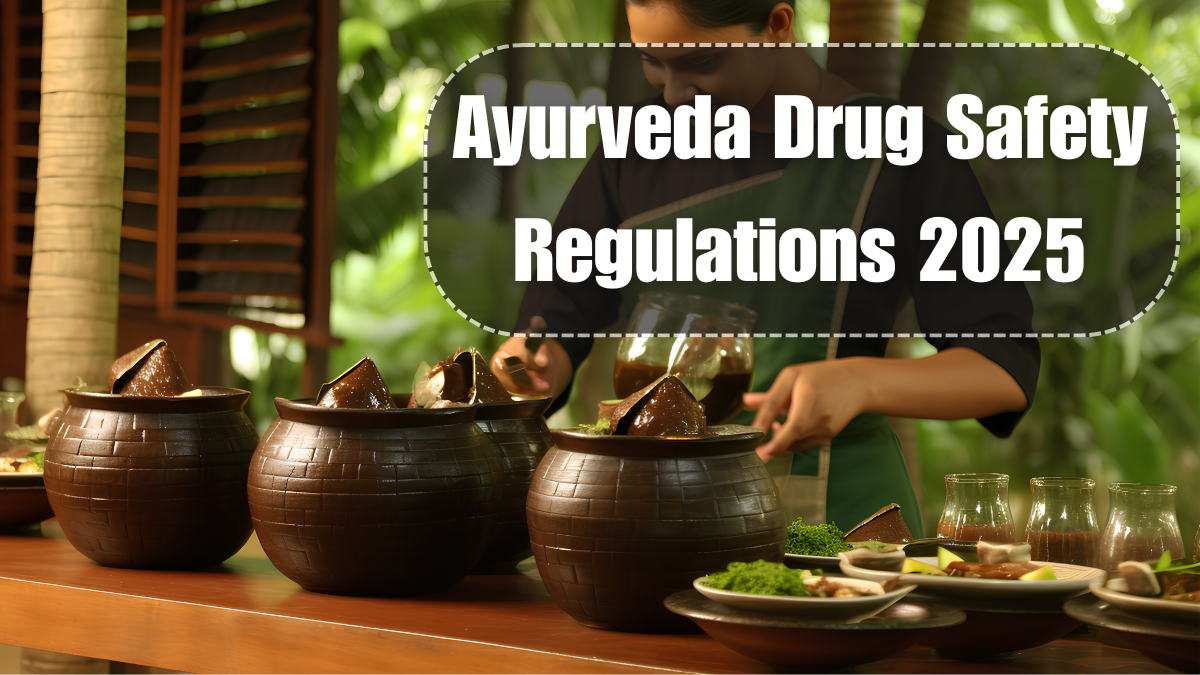The Ayurveda Drug Safety Regulations 2025 mark a groundbreaking shift in India’s approach to traditional medicine. With Ayurveda becoming more mainstream both in India and globally, the Ministry of AYUSH has implemented updated safety and quality standards to regulate clinical trials, herbal formulations, and product labeling.
These reforms are aimed at safeguarding public health while promoting authentic Ayurvedic practices. The new guidelines under the Ayurveda Drug Safety Regulations 2025 are being welcomed by researchers, manufacturers, and practitioners alike for bringing structure and transparency into Ayurvedic drug development.

What’s New in the 2025 Ayurveda Drug Safety Framework?
Under the Ayurveda Drug Safety Regulations 2025, a comprehensive checklist of safety protocols and trial procedures has been released. These standards align with WHO guidelines and Indian Pharmacopoeia Commission (IPC) benchmarks for herbal drugs.
Key regulatory updates include:
-
Mandatory clinical evaluation of proprietary Ayurvedic formulations
-
Introduction of pharmacovigilance systems for Ayurveda products
-
Standardized toxicity testing and trial registration
-
Labeling of formulations with dosage, safety warnings, and shelf life
-
Formation of an Ayurveda Drug Regulatory Authority (ADRA)
-
Licensing only after multi-stage safety trials
These initiatives will strengthen public trust and ensure that Ayurveda Drug Safety Regulations 2025 are not just symbolic, but practically impactful.
Approved Trial Protocols for Ayurvedic Products
The Central Council for Research in Ayurvedic Sciences (CCRAS) has launched detailed guidelines for clinical trial designs for herbal formulations under the Ayurveda Drug Safety Regulations 2025. Trials are now categorized based on whether the product is classical or proprietary.
Approved protocols include:
-
Phase I trials for toxicity and safety
-
Phase II & III for efficacy and dosage evaluation
-
Post-marketing surveillance for side effects tracking
-
Detailed case documentation and ethical approvals
-
Use of standardized extracts to avoid variation
These changes mean that Ayurvedic products will now undergo similar scrutiny as allopathic medicines, making Ayurveda Drug Safety Regulations 2025 a major leap forward in evidence-based traditional medicine.
How Manufacturers Are Responding to the New Safety Norms
Top Ayurvedic brands such as Dabur, Baidyanath, Himalaya, and Patanjali have started adapting their product lines to the new framework. Manufacturing units have upgraded their facilities to include Good Manufacturing Practice (GMP) and clinical validation labs.
What manufacturers are doing:
-
Hiring trained Ayurveda researchers
-
Collaborating with medical colleges for trials
-
Registering products with AYUSH e-portals
-
Clearly labeling all formulations with clinical data
-
Introducing consumer safety helplines
The Ayurveda Drug Safety Regulations 2025 are also boosting export potential by making Indian herbal products compliant with global expectations.
Consumer Impact: More Confidence and Better Labeling
One of the most important outcomes of the Ayurveda Drug Safety Regulations 2025 is the improvement in consumer confidence. Patients now receive clear dosage instructions, side effect warnings, and verifiable safety info before using Ayurvedic drugs.
Benefits for consumers include:
-
Safer formulations with verified ingredients
-
Products backed by clinical testing and approvals
-
Easy-to-read labels with safety disclaimers
-
Online databases to verify product registration
-
Access to customer support channels for queries
Consumers in India and abroad are now more willing to trust Ayurvedic solutions, thanks to the real-time application of the Ayurveda Drug Safety Regulations 2025.
FAQs
What are the Ayurveda Drug Safety Regulations 2025?
They are the latest set of guidelines issued by the Ministry of AYUSH to ensure safety, efficacy, and transparency in Ayurvedic medicine.
Do Ayurvedic products need to undergo clinical trials now?
Yes. All proprietary Ayurvedic drugs must go through multi-phase clinical trials as part of the Ayurveda Drug Safety Regulations 2025.
Are traditional Ayurvedic formulations affected by this?
Classical formulations listed in the AYUSH pharmacopeia are exempt, but any new combination or proprietary formulation must follow trial protocols.
How does this benefit consumers?
Consumers will now get access to safer, labeled, and clinically tested Ayurvedic products, improving health outcomes and trust.
What happens to non-compliant manufacturers?
Companies that don’t comply with the Ayurveda Drug Safety Regulations 2025 will lose licenses, face penalties, or have their products recalled.
Click here to know more.
